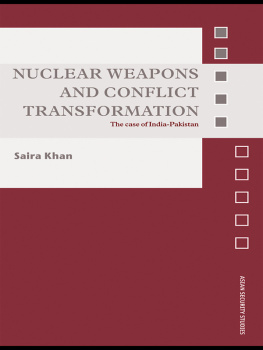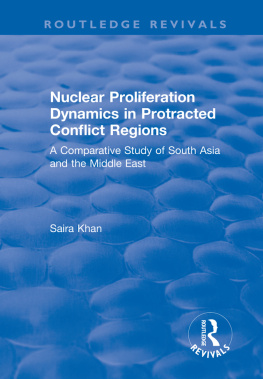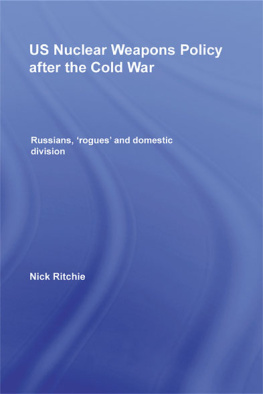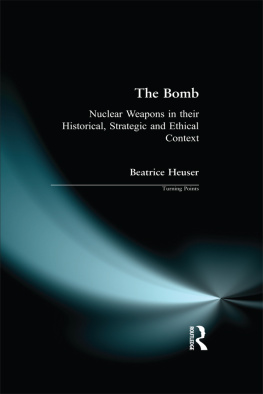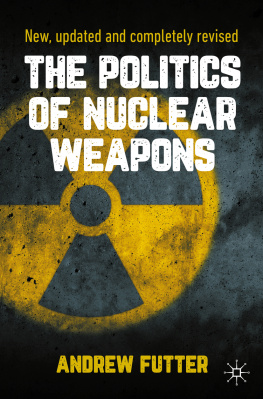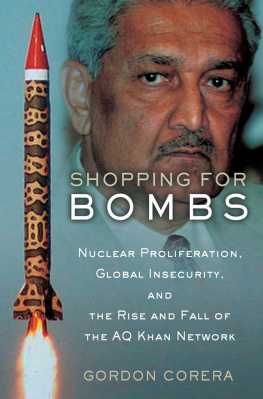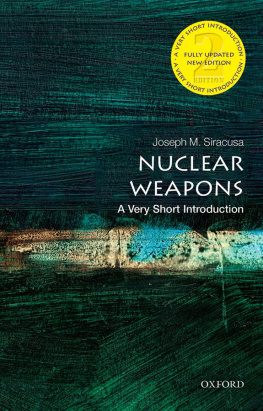Saira Khan - Nuclear Weapons and Conflict Transformation
Here you can read online Saira Khan - Nuclear Weapons and Conflict Transformation full text of the book (entire story) in english for free. Download pdf and epub, get meaning, cover and reviews about this ebook. year: 2008, publisher: Routledge, genre: Politics. Description of the work, (preface) as well as reviews are available. Best literature library LitArk.com created for fans of good reading and offers a wide selection of genres:
Romance novel
Science fiction
Adventure
Detective
Science
History
Home and family
Prose
Art
Politics
Computer
Non-fiction
Religion
Business
Children
Humor
Choose a favorite category and find really read worthwhile books. Enjoy immersion in the world of imagination, feel the emotions of the characters or learn something new for yourself, make an fascinating discovery.
- Book:Nuclear Weapons and Conflict Transformation
- Author:
- Publisher:Routledge
- Genre:
- Year:2008
- Rating:4 / 5
- Favourites:Add to favourites
- Your mark:
- 80
- 1
- 2
- 3
- 4
- 5
Nuclear Weapons and Conflict Transformation: summary, description and annotation
We offer to read an annotation, description, summary or preface (depends on what the author of the book "Nuclear Weapons and Conflict Transformation" wrote himself). If you haven't found the necessary information about the book — write in the comments, we will try to find it.
Saira Khan: author's other books
Who wrote Nuclear Weapons and Conflict Transformation? Find out the surname, the name of the author of the book and a list of all author's works by series.
Nuclear Weapons and Conflict Transformation — read online for free the complete book (whole text) full work
Below is the text of the book, divided by pages. System saving the place of the last page read, allows you to conveniently read the book "Nuclear Weapons and Conflict Transformation" online for free, without having to search again every time where you left off. Put a bookmark, and you can go to the page where you finished reading at any time.
Font size:
Interval:
Bookmark:
Indiana University, Bloomington and US Army War College
- China and International Institutions
Alternate paths to global power
Marc Lanteigne
- Chinas Rising Sea Power
The PLA navys submarine challenge
Peter Howarth
- If China Attacks Taiwan
Military strategy, politics and economics
Steve Tsang (ed.)
- Chinese Civil-Military Relations
The transformation of the Peoples
Liberation Army
Nan Li (ed.)
- The Chinese Army Today
Tradition and transformation for
the 21st century
Dennis J. Blasko
- Taiwans Security
History and prospects
Bernard D. Cole
- Religion and Conflict in South and
Southeast Asia
Disrupting violence
Linell E. Cady and Sheldon W. Simon
(eds)
- Political Islam and Violence in
Indonesia
Zachary Abuza
- US-Indian Strategic Cooperation
into the 21st Century
More than words
Sumit Ganguly, Brian Shoup
and Andrew Scobell (eds)
- India, Pakistan and the
Secret Jihad
The covert war in Kashmir,
19472004
Praveen Swami
- Chinas Strategic Culture and
Foreign Policy Decision-Making
Confucianism, leadership and war
Huiyun Feng
- Military Strategy in the Third
Indochina War
The last Maoist war
Edward C. ODowd
- Asia Pacific Security
US, Australia and Japan and
the new security triangle
William T. Tow, Satu Limaye, Mark
Thomson and Yoshinobu Yamamoto
- China, the United States and
South-East Asia
Contending perspectives on politics,
security and economics
Evelyn Goh and Sheldon W. Simon
- Conflict and Cooperation in
Multi-Ethnic States
Institutional incentives, myths and
counter-balancing
Brian Dale Shoup
- Chinas War on Terrorism
Counter-insurgency, politics and
internal security
Martin I. Wayne
- US Taiwan Policy
Constructing the triangle
ystein Tunsj
- Conflict Management, Security and
Intervention in East Asia
Third-party mediation and intervention
between China and Taiwan
Jacob Bercovitch, Kwei-Bo Huang, and
Chung-Chian Teng, eds
- South Asias Cold War
Nuclear weapons and conflict in
comparative perspective
Rajesh M. Basrur
- The Rise of China and International
Security
America and Asia respond
Kevin J. Cooney and Yoichiro Sato, eds
- Nuclear Proliferation in South Asia
Crisis behaviour and the bomb
Sumit Ganguly and S. Paul Kapur, eds
- Nuclear Weapons and Conflict
Transformation
The case of IndiaPakistan
Saira Khan

by Routledge
2 Park Square, Milton Park, Abingdon, Oxon, OX14 4RN
by Routledge
270 Madison Avenue, New York, NY 10016
A catalogue record for this book is available from the British Library
Khan, Saira.
Nuclear weapons and conflict transformation : the case of India-Pakistan / Saira Khan.
p. cm. (Asian security studies)
Includes bibliographical references.
1. Nuclear arms control. 2. Conflict management. I. Title.
JZ5665.K53 2008
355.02'170954dc22
2008009167
ISBN10 0-203-89176-7 (ebk)
ISBN13 978-0-203-89176-6 (ebk)
Font size:
Interval:
Bookmark:
Similar books «Nuclear Weapons and Conflict Transformation»
Look at similar books to Nuclear Weapons and Conflict Transformation. We have selected literature similar in name and meaning in the hope of providing readers with more options to find new, interesting, not yet read works.
Discussion, reviews of the book Nuclear Weapons and Conflict Transformation and just readers' own opinions. Leave your comments, write what you think about the work, its meaning or the main characters. Specify what exactly you liked and what you didn't like, and why you think so.

